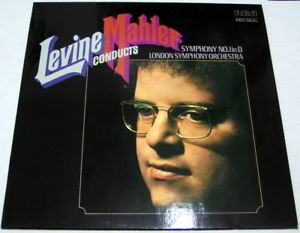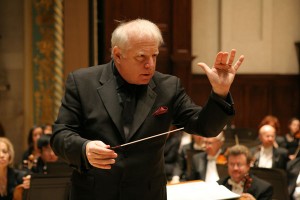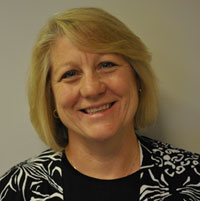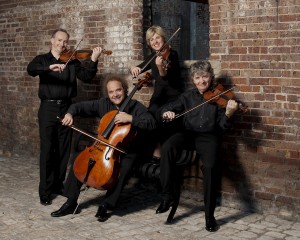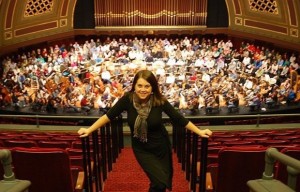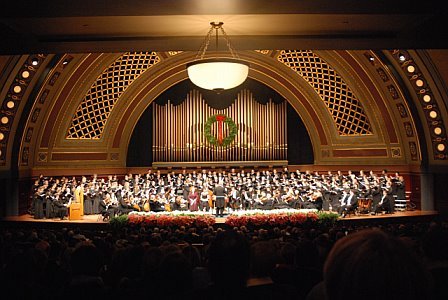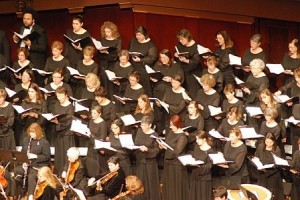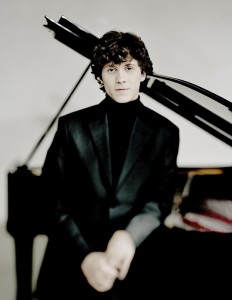Student Spotlight: Alice Schmitz at The Knights
This post is part of a series of posts by students who are part of our 21st Century Student Internship program. As part of the paid internship program, students spend several weeks with a company that’s on the UMS season.
U-M student Alice Schmitz was paired with The Knights in Summer 2017. The Knights are in Ann Arbor on November 12, 2017.


Photos: On left, a view of the Hudson River from the park next to my apartment. On right, a shot of a double rainbow taken from a subway car in Brooklyn.
While it was inevitable that I would listen to The Knights, a chamber orchestra hailing from Brooklyn, New York, as a classical bass student in college, I first learned of The Knights because of my love of the banjo. As a middle-schooler, I fell in love with bluegrass and listened to Béla Fleck’s recordings religiously. So when Béla Fleck performed a concert an hour and a half outside of my home in Minneapolis, my mom and I, of course, drove out to see him perform. He collaborated with a string quartet founded by two brothers, Eric and Colin Jacobsen, who also, as chances would have it, had recently started an orchestra called The Knights. So when I learned this May that I would be interning with The Knights, with a start date just a week away, it felt like fate. To work with an ensemble that has collaborated with the likes of Yo-Yo Ma, Gil Shaham, and the rock band Dr. Dog, was beyond any of my expectations for this experience.


Photos: On left, the orchestra rehearses at the Naumburg Bandshell for its performance that evening. On right, members of The Knights perform with Lisa Loeb for a family concert at the Celebrate Brooklyn! Festival.
I think the picture below almost captures the essence of The Knights’ spirit that made their vision so enticing and invigorating to me. I took it during my first evening as a Knights intern, during a celebration for BLUESHIFT, a group of donors the ensemble created to allow young donors the same access to the ensemble and its creative process as other supporters. In the photo, a baby doll lies next to the remains of a barbecue while the audience listens to a Colin Jacobsen’s performance of a Schubert Sonatina, which, Colin casually mentions, would also be performed at the Tanglewood Festival later that summer alongside the legendary Immanuel Ax.
The scene, like The Knights, was the perfect intersection of the exceptional and the everyday. The Knights’ model is revolutionary because they acknowledge and embrace the fact that classical music does not belong on a pedestal, separated from its audience, but rather classical music should be folded into the fabric and beauty of the life of every member of the ensemble’s vast community of listeners. Knights coexist in both the world of Tanglewood and the Elbphilharmonie and the world of Brooklyn parks and breweries. While some ensembles performing the classical repertoire have confined themselves to a rote form, canon, and setting, The Knights easily adjust themselves to any circumstance and eagerly seek a broad range of these circumstances.


Photos: On left, a baby doll lies next to the remains of a barbecue while the audience listens to a Colin Jacobsen’s performance of a Schubert Sonatina. On right, a rehearsal for the Tanglewood performance in the same space.
The Knights’ administrative office, where I spent the majority of my internship, is located in a Brooklyn townhouse, tucked on the floor between the apartments of the two artistic directors of the orchestra, Colin and Eric Jacobsen. As an intern in a small and dynamic team of administrators, I was able to participate in virtually all facets of the work which make The Knights’ success possible.
I researched opportunities for funding, assisted at rehearsals, drafted grant proposals, and learned about the National Endowment for the Arts guidelines, all the while chatting about punk operas and jazz masses with my coworkers. I was also generously included in community engagement meetings, a post-concert celebration in Central Park, and a board meeting. The Kinghts board includes both leaders of brand-name companies and record labels and members of the orchestra. The whiteboard I sat next to at the office was a daily reminder of the ensemble’s commitment to honoring their members’ needs in this way, covered with notes on how to improve the rehearsal process and support the lives and of the musicians.


Photos: On left, lunch with The Knights office staff on the last day of my internship. On right, fellow intern Patricia and I staff the merchandise table during a performance at the Celebrate Brooklyn! Festival.
It is, of course, impossible to write about spending the summer as an arts intern in New York City without mentioning the city itself. In the six weeks I spent living in New York, I was able to attend more performances, exhibitions, and cultural events than I had attended in the past year. During my very first two days in the city, I watched the New York Philharmonic from the VIP section of their concert in Central Park, stumbled upon a musical in a subway station, and scored free tickets to a performance by one of my childhood idols in a tiny eyewear shop. Living in an apartment in the heart of Washington Heights, I would fall asleep to Despacito outside and wake to my apartment-mate working on material for his noise album.


Photos: On left, a musical performance at the Fulton Street Station I discovered after getting lost on the subway. On right, meeting a childhood hero, vocalist José James, after his performance at an eyewear store.
Working with The Knights in one of the most dynamic cities in the world was the most empowering and enriching experience I have ever had. I am extremely indebted for the warmth and support I experienced as an intern in the ensemble’s office, and for this internship opportunity, without which none of this would have been possible. I cannot wait to enjoy a performance by The Knights on November 12 in Ann Arbor, this time with Avi Avital and Kinan Azmeh. Having spent hours researching and writing about this program for a grant supplement, I can promise that this concert is not one to be missed!
See The Knights on November 12, 2017.
UMS Presents Rotterdam Philharmonic Orchestra 2/19
Learn more about the show on 2/19: http://bit.ly/1tIkfO7
Quiz: Test your classical music savvy!
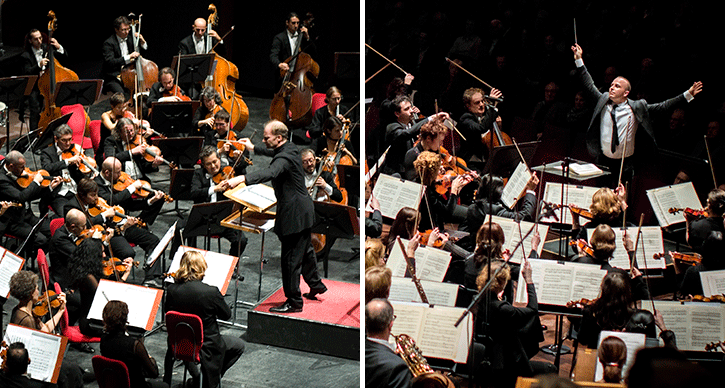
On the left, Teatro Regio Torino Orchestra, who performs the opera William Tell in concert at Hill Auditorium on December 9, 2014. On the right, Rotterdam Philharmonic Orchestra, who will be in Ann Arbor on February 19, 2015.
We’ve put together a handy quiz that tests your classical music savvy. Are you a classical music super ninja or are you a ninja-in-training? Find out through this short quiz (masterfully put together by UMS Student Commitee member Ian Nilsen).
[slickquiz id=1]
A ninja of every level can enjoy the classical music concerts that are part of our 2014-2015 season! Explore our full season or watch our season announcement video.
UMS Playlist: Classical Music Old Friends from Communications Director Sara Billmann
This post is a part of a series of playlists curated by UMS staff, artists, and community. Check out more music here.
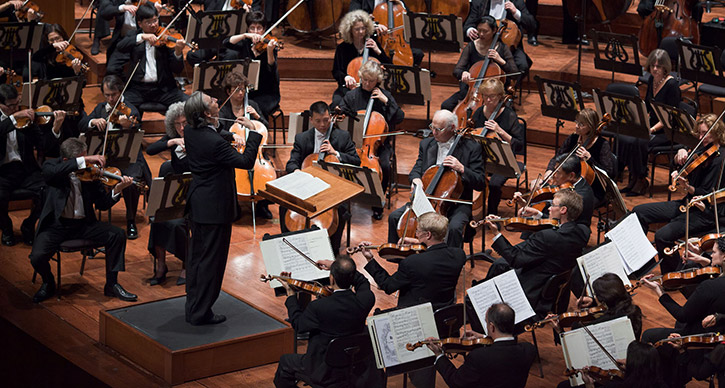
Photo: San Francisco Symphony, who’ll perform Mahler Symphony No. 7 at Hill Auditorium on November 13, 2014.
I grew up in a small town in Wisconsin and studied piano from age 5 and oboe from age 11 in a family where music was central. My mother was a piano teacher, taught vocal music in the public schools, and directed her church choir; my sister became a professional horn player and freelances in New York; and even my father, a middle school math teacher for over 35 years, participated by periodically singing in a local chorus and playing the baritone in a local German band.
Because of that background, I was constantly exposed to classical music, but there are some pieces that stand out as having made an incredible impression on me as a young musician from the time of middle school until early college. While my tastes have certainly evolved over the years, these are still my “old friends” that I love to revisit and never grow tired of.
Mahler’s Symphony No. 1: I fell in love with this piece in 7th or 8th grade and can remember being home alone, turning out all of the lights, and lighting candles to listen to an early James Levine recording in a complete solitude. Mahler could take me to a place of incredible peace, only to be interrupted by the bombastic beginning to the fourth movement, which always scared the bejeezus out of me. To this day, I’m still a pushover for Mahler and the emotional range that his symphonic and vocal works explore.
Bach Brandenburg Concerto No. 2: As an oboe player, I loved playing along with the record of Bach’s Brandenburg Concerto No. 2. It’s such a joyful piece, fun to play, but also fun to listen to. My sister would occasionally play along with me, adapting the trumpet part for horn.
Beethoven Symphony No. 9: I played this work in high school with my local orchestra (with my sister also in the orchestra and my dad in the chorus). Being immersed in the sound of full orchestra plus chorus all on one stage was a remarkable experience for a young musician.
Tchaikovsky’s Capriccio Italien: While seemingly not performed very often these days, this is one of the first classical music pieces that I can remember falling in love with, probably in about 5th or 6th grade. If I remember correctly, we had an LP that included Capriccio Italien, Marche Slave, and 1812 Overture, but it was always Capriccio Italien that I returned to time and again.
Dvorák’s “New World” Symphony: Dvorák’s works are readily accessible and easy to listen to, but certainly not “easy listening.” A recent New York Times article talked about how Dvorák ended up in Iowa, where he wrote this symphony.
Schubert: When I left Wisconsin to move to Ann Arbor to attend the University of Michigan, my sister (then a senior at the University of Wisconsin) made a couple of cassette tapes for me of some of her favorite pieces by Schubert, which I listened to constantly for several years. Among the highlights: Dietrich Fischer-Dieskau singing Die schöne Müllerin, the “Trout” Quintet and the Rondo in D Major for piano duo. Sadly, her tape ran out in the middle of the work, and it was years before I heard how it ended.
Shostakovich: Michael Gowing, the former UMS ticket office manager who retired over a decade ago, considered Shostakovich a “B movie composer,” but I always loved his works. While in college here at U-M, I heard Mariss Jansons conduct the Oslo Philharmonic in Shostakovich’s Symphony No. 7 with its Bolero-like theme, and it was an extraordinary event that began a lifelong appreciation for Shostakovich’s works. I still love listening to the string quartets (especially Nos. 7, 8, and 15), his piano quintet, and many of the symphonies. The Kirov Orchestra’s performance of his Symphony No. 13 several years ago left me in tears, completely shaken at the power of music.
Listen to various selections and recordings of Sara’s picks on Spotify:
What did you think about this playlist? Share your thoughts or song suggestions in the comments below.
Fifteen Minutes with Fame: The Audra McDonald Q&A
 Editor’s Note: Audra McDonald performed at Hill Auditorium on November 4 as part of 11/12 UMS Season. A brief Q&A session with U-M Musical Theatre students preceded the performance. Sarah Bichsel, UMS Social Media Intern, attended and transcribed this session.
Editor’s Note: Audra McDonald performed at Hill Auditorium on November 4 as part of 11/12 UMS Season. A brief Q&A session with U-M Musical Theatre students preceded the performance. Sarah Bichsel, UMS Social Media Intern, attended and transcribed this session.
When I was eight years old, my mother brought home the new Disney version of Annie on VHS (this was still a time when you could purchase a VHS tape without the store clerk bursting into laughter). My mother purchased Annie knowing that I loved both musicals and the prospect of stardom, and as we watched it together, I’m sure she was gratified by the sight of my attempts to sing along. The movie became one of my favorites, mainly because I believed I could sing better than the girl who played Annie, and it was not uncommon to find me in the living room belting out “Tomorrow” in front of the TV. There was one person in the film, th0ugh, for whom I had the utmost reverence, and that was Audra McDonald. When she came on the screen, I was transfixed as she glided effortlessly over each note. Her voice was sacred, her music ethereal. Even as I grew older and drifted farther from my interest in performance fame, I remembered her and cheered as she triumphed in one concert after another. I hope that you will all be as inspired by her as I was and still remain.
From the Q&A Session:
Why don’t you tell us about the program tonight?
Audra McDonald: I’m a bit of an eclectic personality so it’s going to be a mixture of stuff that you’ve heard me sing before, and some new things. I’m doing some Julie Styne, Adam Guettel, Jason Robert Brown, and then some new composers. I’ll do some that’s modern and some that comes from before you were born–whatever speaks to my heart.
You studied voice at Juilliard. Do you continue to study and have voice lessons?
AM: You must always continue to study voice. I had a voice lesson the night of my performance at Carnegie Hall! A dancer wouldn’t stop doing their barre. What Juilliard gave me was the idea that I had this classical instrument and without my studies there, I wouldn’t have discovered this part of me. I wanted to be a belter. I didn’t want to sound too arch. [She sings an exaggerated, Wagnerian opera note]. But I found that the classical part of my voice is a part of who I am.
How do you approach developing a character?
AM: For me it’s all about finding. Finding the why, finding the verb, finding the arc within the play. I am always searching for the truth. It doesn’t change from role to role. I’m always looking for that arc.
Did you ever study acting specifically?
AM: I never studied acting. Programs were very specific at Juilliard. You’re either in the voice department, or the drama department. Juilliard since I’ve left has become a bit more open…at the time I studied you couldn’t do both.
How did you get involved with Private Practice?
AM: It was interesting. The show was a spin off from Grey’s Anatomy, a Shonda Rhimes production, so it had a certain pedigree. It scared me so much. And in the beginning I had to learn that being in front of the camera wasn’t about giving my entire self. It was an opportunity to learn and get comfortable. You have to bring it down and use those smaller muscles in front of the camera.
What do you like about performing a role versus performing in concert?
AM: What I love about a role where you play the same part is that you get a million chances to get it right. There are some people with whom you can set a watch to their performance. For me if it doesn’t feel alive and true, that doesn’t work. If you mess up one night, you can try again the next night. My director has this saying, “turn the page,” which means that even if you thought that for that night you were brilliant and awesome, don’t hold onto it, turn the page. You have to move on the next night. With concert work, I love the spontaneity of it. It’s nice to not have the fourth wall. You’re actually able to talk to the audience and say, “Hey there! What’d you have to eat?”
What about the diversity of the arrangements on your CDs?
AM: Without music directors we are nothing. They help give you fresh perspective. You say to them, “Is there a way to make this funnier or sadder or faster,” and they scribble it down and say here I know what you mean.
How do you balance family life and your career?
AM: My family is the most important thing to me. I’ve read a quote from Renee Fleming that says, “I don’t get paid to be on stage, I get paid to be away from my family.” How does one balance it? I don’t know. Today anyone who wants to have a child can have a child, and you make sacrifices on either end for that family. My family always says to me “sing fast.” It’s all wonderful, but I keep thinking about Tony Award nights. None of it feels real until I’m back on the couch at home having a burger with my kid.
When did you know you wanted to be a performer?
AM: I’ve never done anything else. My dad’s family was very large. They used to say, “oh she’s the dramatic one,” “calm down, it’s just a thunderstorm.” I always knew that I could sing. In my family I have the cute voice. I have some massive voices in my family. “That’s cute,” they all said, that’s what she’s going to do. I can’t do anything else. Don’t ask me to cook!
How did you get involved with GLAAD?
AM: My boyfriend was in Hair with Gavin Creel at the time. After Prop 8 passed, Gavin got very vocal, and the Hair cast got very vocal, and Will [my boyfriend] would come home every night going RAWR! They both gave me the idea of doing the rally. We convinced Austin Eustice to do an equality march and cancel a show for a DC march. Tonight in honor of this cause, I will be doing Gershwin’s “He Loves and She Loves.” Actually, I’ve been thinking about doing a song to combat Herman Cain, “Loving You Is Not A Choice it’s Who I Am.” It’s from Passion.
How do you balance Broadway and classical?
AM: They’re one in the same now. Getting the voice centered, getting the body out of the way constrictively. My coach’s philosophy is always healthy, healthy, healthy and then from there we can find the colors of the voice.
How did you transition from school to real-world auditions?
AM: I was sneaking out of school to audition! The transition was more about going to a classical sound. For me I started to feel better about who I was once I started auditioning, even though I wasn’t necessarily landing. I felt more secure because people weren’t saying “oh you said deh vieni wrong.”
How do you make choices in your career?
AM: I just knew that I wanted to perform. I’m curious about different aspects of the field—I’m open to it all. I think that what’s important is not saying no to certain opportunities—saying I want to try! When they asked me to perform at Carnegie, I’d never sung that high, and I’d given up the classical way, and it should have been no thank you, but I said, “Okay I’ll try!” Go at it with 100% commitment, with passion. Be willing to fall flat on your face!
How does it feel to have work created for you?
AM: It’s an incredible honor. You develop really deep collaborative relationships with directors. It’s like having a suit tailor-made for you. There’s the excitement about having things recognized about you that you might not see yourself. You say, “I can’t go that dark in this role.” Then someone looks at you and yes, you can go darker, you can, and you need to explore this. It has been a growing experience for me.
What are some of the relationships that have impacted you?
AM:
I have a lot of mentors…I also consider them family. Lonny Price is who I call my gay husband. I gave him a wedding ring a few years ago! Really, I did! He’s someone I run every project by. There’s Zoe Caldwell—she scared me so much when we first met and now we talk about everything–I named my daughter after her. And Barbara Cook, who is finally being honored by the Kennedy Center this year! There are just certain people I run all my artistic decisions by.
UMS’s Arts Roundup: October 8
Many members of the UMS staff keep a watchful eye on local and national media for news about artists on our season, pressing arts issues, and more. Each week, we pull together a list of interesting stories and share them with you. Welcome to UMS’s Arts Round-up, a weekly collection of arts news, including national issues, artist updates, local shout-outs, and a link or two just for fun. If you come across something interesting in your own reading, please feel free to share!
Arts Issues
- The DSO isn’t the only performing arts organization in financial trouble. The Dutch government has proposed closing the Netherlands Broadcasting Music Center, dismantling the Netherlands Radio Philharmonic, Netherlands Radio Chamber Philharmonic, Metrople Orchestra, and the Netherlands Radio Choir.
Artist Updates
- Time has run out at 3711 Woodward Ave, and the musicians of the Detroit Symphony Orchestra are on strike.
- The Metropolitan Opera opens fifth season of live high-def broadcasts this weekend with Wagner’s Das Rheingold.
- Riccardo Muti cancels his fall Chicago Symphony appearances due to illness, but violinist Anne-Sophie Mutter was up to the task, directing the season-opening Symphony Ball.
UMS News
- Barbara Hoover of The Detroit News and Susan Nisbett of Ann Arbor.com offer a glimpse at this weekend’s Paul Taylor performances
- And the AnnArbor.com review of Thursday night’s opening performance appeared this morning.
- Valergy Gergiev and the orchestra formerly known as the Kirov (now the Mariinsky) visit Ann Arbor on Sunday with a program of Rachmaninoff and Mahler.
- Japanese butoh troupe Sankai Juku, appearing as part of the UMS dance season in late October, opened their residency at New York City’s Joyce Theater this week.
- Murray Perahia cancels fall tour (including Nov 10 UMS concert) due to hand problems; Vladimir Feltsman takes his place with program of Mozart, Schubert and Chopin
- Takacs Quartet Schubert Concert: AnnArbor.com preview, Kahane out, Feltsman in (again!) for Schubert’s last piano sonata.
Local Shout-Outs
- This is the last weekend to head west to see Grand Rapids’ ArtPrize finalists. The winner of the $250,000 top prize was announced yesterday!
Just For Fun
- Think dance is just for the world’s clubs and stages? Check out this choreographed in-flight safety demonstration by Cebu Pacific. Look out Southwest, somebody’s trying to up the fun quotient!
UMS’s Arts Roundup: September 17
Many members of the UMS staff keep a watchful eye on local and national media for news about artists on our season, pressing arts issues, and more. Each week, we pull together a list of interesting stories and share them with you. Welcome to UMS’s Arts Round-up, a weekly collection of arts news, including national issues, artist updates, local shout-outs, and a link or two just for fun. If you come across something interesting in your own reading, please feel free to share!
Arts Issues
- So many galas, so little time: a look at season-opening celebrations across the country.
Artist Updates
- Pianist Glenn Gould: Nut or Genius? A fresh look through a new documentary.
- NPR talks with Patti LuPone about life on Broadway and her new memoir
- A reflective Riccardo Muti starts his tenure with the Chicago Symphony Orchestra
UMS News
- Don Calamia reviews opening theater production, Susurrus, for Encore Michigan
Local Shout-Outs
- A salute to Lois Beznos by both Crain’s Detroit and Musical America as she steps down as President of the Chamber Music Society of Detroit
- Rolling Stone recognizes Encore Recordings as one of the best
Just For Fun
- Guess there can be only one Graceland: the Liberace Museum in Las Vegas is closing
UMS’s Arts Roundup: September 3
Many members of the UMS staff keep a watchful eye on local and national media for news about artists on our season, pressing arts issues, and more. We thought we’d pull together a list of interesting stories each week and share them with you. Welcome to UMS’s Arts Round-up, a weekly collection of arts news, including national issues, artist updates, local shout-outs, and a link or two just for fun. If you come across something interesting in your own reading, please feel free to share!
Arts Issues
- “Soundcheck Smackdown” looks at the impact and value of live cinema broadcasts.
- The New York Times asks, “Does music make you exercise harder?”
Artist Updates
- Detroit Symphony Orchestra musicians authorize strike after talks fail
- A look at the Royal Shakespeare Company’s new digs
- The struggles of historic Beijng Opera in the 21st Century
- The Village Voice chats with jazz pianist Vijay Iyer about his new album, Solo
Local Shout-Outs
- No Labor Day Weekend plans? Head downtown to the 2010 Detroit International Jazz Festival.
Just For Fun
- Graduating from Kindergarten hardly an accomplishment for this 6-year-old piano prodigy.
- Need to kickstart your workday? Flashmob-turned-flashdance got things jumping at Liverpool Station.
UMS Staff Picks: Detroit Symphony Orchestra/Mahler’s Symphony No. 8 selected by Joanne Navarre, Manager of Annual Giving
SN: Mahler’s Symphony No. 8 (Symphony of a Thousand) is rarely performed due to the tremendous complement of musicians required of this work – what can audience members expect to see and hear when they attend this performance?
JN: They can expect to see and hear, first of all, excellent musicians. The “thousands” on the stage will include the Detroit Symphony, UMS Choral Union, U-M Chamber Choir, U-M University Choir, U-M Orpheus Singers, MSU Children’s Choir and the incomparable Leonard Slatkin leading the charge. The sheer mass of humanity will be impressive to see, and their music will be absolutely unforgettable.
SN: Have you ever seen another of Mahler’s Symphonies performed live? What about the performance(s) was the most memorable for you?
JN: Last season, I was fortunate to be in the audience when the San Francisco Symphony and Michael Tilson Thomas presented Mahler’s Symphony No. 2 (Resurrection), with the choral portion of the fourth movement being performed by the UMS Choral Union. Gustav Mahler believed that, “The symphony must be like the world. It must embrace everything.” In the Resurrection Symphony, he did exactly that; he embraced everything.
SN: What are you most looking forward to about experiencing Mahler 8 live?
JN: I am looking forward to experiencing the power and genius of Mahler’s music in the hands of Leonard Slatkin. This piece is Mahler’s magnum opus; in his words, “the greatest thing I have done.” For Mahler enthusiasts, this is the pinnacle.
SN: What other events are on your “must see” list for the 10/11 season?
JN: After Mahler 8, there are three things on my “must see” list: Susurrus (September 9-October 3, Matthaei Botanical Gardens); The Cripple of Inishmaan (Druid and Atlantic Theater Company), and Richard III and The Comedy of Errors (Propeller). I love theater.
JN: I am a sports fan. I like football and baseball, but I enjoy hockey most of all.
JN: Renée Fleming’s Handel arias, the Hilliard Ensemble’s Morimur, and Les Arts Florissants’ Charpentier album.
UMS’s Arts Round-up: August 20
 Many members of the UMS staff keep a watchful eye on local and national media for news about artists on our season, pressing arts issues, and more. Each week, we pull together a list of interesting stories and share them with you. Welcome to UMS’s Arts Round-up, a weekly collection of arts news, including national issues, artist updates, local shout-outs, and a link or two just for fun. If you come across something interesting in your own reading, please feel free to share!
Many members of the UMS staff keep a watchful eye on local and national media for news about artists on our season, pressing arts issues, and more. Each week, we pull together a list of interesting stories and share them with you. Welcome to UMS’s Arts Round-up, a weekly collection of arts news, including national issues, artist updates, local shout-outs, and a link or two just for fun. If you come across something interesting in your own reading, please feel free to share!
Arts Issues
- The Los Angeles Times asks, “Are Conductors Really Necessary?”
- The National Jazz Museum and audio engineer Doug Pomeroy are on a mission to save “The Savory Collection” of recorded radio broadcasts from the late 1930s
- John Kay of the Financial Times on measuring the true value of the arts
Artist Updates
- A behind-the-scenes look at the making of Renée Fleming’s new album on CBS’s “Sunday Morning”
- Philadelphia Orchestra Joins the Popcorn Crowd
- The Metropolitan Opera set a new opening day record in box office sales for the 2010/11 season
- The Detroit Symphony Orchestra under pressure with contract talks
Local Shout-Outs
- Detroit’s Music Hall announces 2010/11 season
- A remembrance on how the Barton organ saved the Michigan Theater in 1979
Just For Fun
- Dōmo arigatō, Mr. Roboto. But can they really act?
UMS Staff Picks: Takács Quartet selected by Liz Stover, Programming Coordinator
SN: The Takács Quartet has been treating UMS audiences to exceptional performances of chamber works for many years, but in the 10/11 season, there will be not one, but three very special opportunities to hear this quartet as they perform their Schubert Project cycle of concerts. What will be unique and memorable about each of these performances?
LS: It’s not every year that you get to hear so much of a single composer’s work in the span of a season, so I am thrilled for the opportunity to focus some attention on Schubert. While there’s not nearly enough time to hear all of his chamber music, we’ll hear some of my favorites: D.810 (“Death and the Maiden”), the “Trout” Piano Quintet, and the Cello Quintet! We’ve heard the Takács Quartet perform many times here in Ann Arbor (12, to be exact), but I’m also excited to hear them collaborate with other notable musicians: pianist Jeffrey Kahane (who is also music director of the Los Angeles Chamber Orchestra and Colorado Symphony), bassist John Feeney (principal bass of the Orchestra of St. Luke’s in New York), and cellist Paul Katz (who performed here three times as cellist of the Cleveland Quartet).
SN: Have you seen a performance by the Takács Quartet before?
LS: Yes. I saw them the last two times they were here, in March 2010 and April 2009, and I think in January 2007, too. I loved their April 2009 performance with Marc-André Hamelin when they performed the Schumann Piano Quintet. The first time I ever played chamber music for fun was with a piano quintet (though we played Brahms) so I really enjoy hearing that repertoire. It makes me think back to how challenging it was for me and how much I learned as a musician from playing in a small group rather than an orchestra.
SN: What are you most looking forward to about this series of performances?
LS: To begin with, I just love Schubert…his compositions can be so heartbreakingly romantic. Did you hear David Finckel, Wu Han, and Philip Setzer play the piano trios in February? There wasn’t a dull moment in that concert—it was a highlight of the season for me. As I mentioned before, it’s really exciting to hear so much of one composer’s work in one season, and this series of concerts lines up with a personal goal to build my knowledge of classical repertoire. I also share a love for chamber music (and Schubert) with my boyfriend Zack, who is a violist, so I’m looking forward to experiencing the concerts together.
SN: What other events are on your “must see” list for the 10/11 season?
LS: Mahler’s Fifth Symphony is one of the very reasons I work at UMS (hearing it performed by the New York Philharmonic in February 2005 made me instantly apply to become a UMS intern as a student) so I can’t wait to hear it again by the Mariinsky Orchestra. I’m also really excited about our collaboration with the Detroit Symphony Orchestra and Michigan Opera Theater to present Mahler’s Eighth Symphony. It’s a once-(or very few) in-a-lifetime opportunity to hear it performed and I’m excited to be involved in the production of that event. I’ve also become a huge dance lover over the past few years, so I’m looking forward to seeing all of the companies on our season—all are new to me! I also won’t miss Stew and the Negro Problem, Carolina Chocolate Drops, and Druid’s production of The Cripple of Inishmaan.
SN: What do you enjoy doing outside of work?
LS: Knitting! Almost two years ago, I began knitting seriously, and I have fallen in love with it! It’s a wonderful stress reliever and I just love the feeling of producing something. I’m currently working on a cardigan. I’ve even taught a few friends and coworkers to knit and it’s so exciting to see them producing beautiful garments. Besides that, I enjoy watching baseball (my boyfriend has turned me into a Red Sox fan), traveling, and spending time with friends and family (including my two dogs, Rumor and Gypsy, who live with my parents in the DC area). I’m also hoping to take my violin out soon and start playing more regularly as it’s been in my closet for the last year—I’m sure these concerts will inspire me to do so!
SN: What have you been listening to on your iPod?
LS: Since we presented Punch Brothers at the Power Center last summer, I have not been able to stop listening to them! Their CDs Punch and Antifogmatic are in very frequent rotation as well as some of their earlier work under Chris Thile’s name. I have also recently taken up spinning at the Y, and Lady Gaga helps me get through a solid hour of exercise. Other favorites include Broken Bells, Dave Matthews Band, Ingrid Michaelson, and Wilco. When it comes to classical music, Mahler and Rachmaninoff are two of my favorite composers, so this season’s repertoire is especially exciting for me!
Volunteer Spotlight: UMS Choral Union
After moving to Ann Arbor three and a half years ago, one of my first orders of business was to go online to find a chorus that I could audition for. Being a classically-trained singer coming from Jacksonville, Florida and having sung with the Jacksonville Symphony Chorus throughout the three years I lived there, I knew choral music-making was a part of my life I wanted to continue in Ann Arbor. It seemed a logical first step to go to the Detroit Symphony Orchestra’s website where I would presumably find audition information about their symphony chorus. Instead, I discovered that they did not have their own chorus, but performed choral pieces with a group called the UMS Choral Union. I decided to find out a little more about this chorus and discovered some particularly impressive facts: the group has a 132-year history, they won a Grammy Award in 2006, and they have 180 members. I had certainly found my chorus! An audition, countless Monday night rehearsals, and several incredibly memorable concert experiences later, singing with the UMS Choral Union has been everything and more that I hoped it would be!
Throughout my time singing with the Choral Union, I have always been amazed by the incredible variety of backgrounds, ages, and even geographic locations of the people that make up this volunteer ensemble. I recall from this past winter, one of my fellow choristers arriving to the rehearsal following the gold medal hockey game of the Vancouver Winter Olympics wearing a Team Canada hockey jersey and moose antlers! Yes, we even have singers that come from Windsor, Ontario to be a part of this amazing group. The UMS Choral Union holds auditions for new singers twice a year – once in the spring and once in the fall, and everyone is welcome to audition.
Despite all the diverse interests of the singers in the Choral Union, there is one unifying quality that brings us all together, and makes us more than happy to donate our time: our love of singing and making music as an ensemble. And this is exactly what we do when we come together for our two and a half hour-long rehearsals every Monday night to prepare the, on average, four pieces of music we perform with either the DSO or A2SO throughout the year. These rehearsals are led by conductor Jerry Blackstone, who has been the director of the UMS Choral Union since 2004. In the upcoming 10/11 season, Jerry will be preparing us for performances of Handel’s Messiah (a Choral Union tradition!), Mahler’s Symphony No. 8, Beethoven’s Symphony No. 9, and Mahler’s Symphony No. 3.
I’ve had people ask me “why do you give so much of your time to the Choral Union when you don’t get paid?” Simple: singing under the baton of legendary conductor Sir Neville Marriner, looking out into a packed house from the stage of Hill Auditorium after an unforgettable performance of Mahler’s Symphony No. 2 with the San Francisco Symphony, and getting a lump in my throat as I sing the final measures of the Alleluia in “Worthy is the Lamb” from Handel’s Messiah, even though I’ve sung it dozens of times before. These are all memories I have from the past year of singing with the UMS Choral Union; memories that are quite special to me…why would I not be involved in this incredible ensemble? I can hardly wait for the musical experiences ahead this season!
UMS Arts Round-up: August 6
 Many members of the UMS staff keep a watchful eye on local and national media for news about artists on our season, pressing arts issues, and more. We thought we’d pull together a list of interesting stories each week and share them with you. Welcome to UMS’s Arts Round-up, a weekly collection of arts news, including national issues, artist updates, local shout-outs, and a link or two just for fun. If you come across something interesting in your own reading, please feel free to share!
Many members of the UMS staff keep a watchful eye on local and national media for news about artists on our season, pressing arts issues, and more. We thought we’d pull together a list of interesting stories each week and share them with you. Welcome to UMS’s Arts Round-up, a weekly collection of arts news, including national issues, artist updates, local shout-outs, and a link or two just for fun. If you come across something interesting in your own reading, please feel free to share!
National Issues
- In Seattle, dance class (modeled after Mark Morris’ Dance for PD) helps Parkinson’s patients
Artist Updates
- Alec Wilkinson of The New Yorker sits in on Wynton Marsalis’s latest project
- Politics as unusual? Wyclef Jean contemplates run for Haitian presidency
- A match made in heaven or a shotgun wedding? The Wall Street Journal discusses a possible merger between the Kennedy Center and the National Opera
- Boston Pops conductor Keith Lockhart takes the helm at the BBC Concert Orchestra
Local Shout-Outs
- Ann Arbor theater troupe Performance Network announces its 2010/11 season.
- Blackbird Theatre, another Ann Arbor theater company, spreads its wings with a move to the Kerrytown District
Just for Fun
“Flash Opera” at the Reading Terminal by the Philadelphia Opera Chorus!
UMS’s Arts Round-up: July 30, 2010
 Many members of the UMS staff keep a watchful eye on local and national media for news about artists on our season, pressing arts issues, and more. We thought we’d pull together a list of interesting stories each week and share them with you. Welcome to UMS’s Arts Round-up, a weekly collection of arts news, including national and international arts issues, artist updates, local shout-outs, and a link or two just for fun. If you come across something interesting in your own reading, please feel free to share!
Many members of the UMS staff keep a watchful eye on local and national media for news about artists on our season, pressing arts issues, and more. We thought we’d pull together a list of interesting stories each week and share them with you. Welcome to UMS’s Arts Round-up, a weekly collection of arts news, including national and international arts issues, artist updates, local shout-outs, and a link or two just for fun. If you come across something interesting in your own reading, please feel free to share!
Arts Issues
- Ever wonder just what goes into bringing international artists to the US? For the first time since 9/11, the Federal Government is about to expedite part of the process.
- Writers, composers, painters, and inventive scientists have all suffered from it. Find out how some of the world’s greatest artists fought creative block.
- Check out the new trend in theater: an audience of one.
Artist Updates
- Chris Lydon of the Huffington Post sits down with jazz pianist Vijay Iyer to talk about about his heritage, growing up in New York, and the spaces in between.
- Bill T. Jones and others pay tribute to Merce Cunningham with original performances commemorating the first anniversary of this death.
- Nathaniel Ayers, whose life was the basis for the movie The Soloist, continues his inspirational battle with Schizophrenia with a triumphant performance at the White House to mark the 20th anniversary of the Americans with Disabilities Act
- It’s the year 2010, and the Vienna Philharmonic is in more hot water with the public and government funders and the public over issues of gender equality in hiring practices.
Local Shout-Outs
- Congrats to the DSO and the DIA, who were both recently awarded major grants by Detroit foundations.
- U-M’s Residential College celebrated the 10th anniversary of its Shakespeare in the Arb program with performances of A Midsummer Night’s Dream last month. Here’s a look at this year’s event through a photo gallery.
Just For Fun
- Looking for a place to crash this fall? The Museum of Science and Industry in Chicago is looking for someone to spend a month living at the museum 24/7.
UMS Staff Picks: pianist Rafal Blechacz selected by Susie Bozell Craig, Marketing and Corporate Partnerships Manager
SN: Although a relatively young artist, Rafal Blechacz has already established himself as a rising star in the international classical music community. How has he, at only 25 years of age, made his mark in that community and around the world?
SBC: Although he’d won several major piano competitions already, when one wins the Chopin Competition it comes with incredible opportunities. Winning the Gold Medal and all individual prizes in 2005 opened the door for him to perform at Tchaikovsky Hall in Moscow with the Mariinsky Orchestra and Valery Gergiev, at the Concertgebouw in Amsterdam, Wigmore Hall in London, and the Palais des Beaux Arts in Brussels among others. It also helped secure a five-year recording contract with Deutsche Grammophon which has so far resulted in three albums, including perhaps the best recording of Chopin’s Preludes I’ve ever come across.
SN: What “flavor” does he bring to his performance that distinguishes him as such an impressive talent?
SBC: What impresses me so much about Rafal is the incredibly musical maturity he possesses. In many ways, technical prowess is the easy part. But the ability to spin phrases with perfect balance and timing, to not take too many liberties while still drawing out poignancy, the achievement of an incredibly organic result…this takes true mastery. Artists can work for years and still not achieve this.
SN: What are you most looking forward to about his upcoming Ann Arbor performance?
SBC: Chopin is one of my favorite composers for the piano, and to hear a true artist perform his works, which are so romantic with their sense of longing, nostalgia, grief…I think it will be an incredibly emotional experience.
SN: What other events are on your “must see” list for the 10/11 season?
SBC: I’m looking forward to both of the Russian orchestras, the Mariinsky and St. Petersburg, with their blockbuster programs; also Susurrus as a totally unique and intimate experience; and the two Shakespeare plays with Propeller Theater Company, both of which are new to me.
SN: What do you enjoy doing outside of work?
SBC: I’m a pretty active tennis player, and I before I started working at UMS I made a living as a flutist and still enjoy practicing and teaching. My husband and I are also looking forward to the birth of our first child late this fall.
SN: What have you been listening to on your iPod?
SBC: Well, yesterday I listened to Rachmaninoff’s second and third piano concertos in preparation for the season. I’m headed over to Lake Michigan next weekend and that always brings out summertime favorites like Jack Johnson and a quirky folk band from northern Michigan called Third Coast. It’s got a pretty wide array of artists to suit the occasion and mood.
Which pianist featured on the 10/11 season are you most looking forward to hearing?
UMS’s Arts Round-Up: July 16, 2010
 Many members of the UMS staff keep a watchful eye on local and national media for news about artists on our season, pressing arts issues, and more. We thought we’d pull together a list of interesting stories each week and share them with you. Welcome to UMS’s Arts Roudup, a weekly collection of arts news, including national issues, artist updates, local shout-outs, and a link or two just for fun. If you come across something interesting in your own reading, please feel free to share!
Many members of the UMS staff keep a watchful eye on local and national media for news about artists on our season, pressing arts issues, and more. We thought we’d pull together a list of interesting stories each week and share them with you. Welcome to UMS’s Arts Roudup, a weekly collection of arts news, including national issues, artist updates, local shout-outs, and a link or two just for fun. If you come across something interesting in your own reading, please feel free to share!
National Issues
- Feeling a little less creative? You’re not alone, as a new study shows a dramatic decline in creativity among US citizens.
- The Big Read just got a lot smaller, as the NEA slashed funds to the nation’s largest book club program.
- Can you carry a tune? Here are two new reasons to sing. First, putting words to music appears to dramatically help stroke patients who have lost speech skills recover. Second, singing together encourages cooperation. Looks like Maria Von Trapp got it right with those kids!
- Remember Gustavo Dudamel’s rise to fame through Venezuela’s El Sistema? A group of hand-picked music educators on fellowship at the New England Conservatory is now attempting to bring its principles to the US with El Sistema USA. Here’s the first in a series of articles and videos about the incredible phenomenon.
Artist Updates & New Companies to Watch
- Rumors abound that Pierre Boulez may be writing an opera based on Samuel Beckett’s Waiting for Godot.
- Simon McBurney’s A Disappearing Number disappeared from Ann Arbor nearly two years ago, but it’s been found again — at the Lincoln Center Festival this weekend, and coming to a theater near you as part of the National Theater of London’s live broadcast series this fall. Stay tuned for an announcement about a local screening…
- What’s that up in the sky? It’s a bird, it’s a plane, no…it’s Ameba Acrobatic and Ariel Dance.
Local Shout-Outs
- Congratulations, Ann Arbor! Our college town was noted as a “mecca of arts and culture” as it was named one of CNNMoney’s top 100 best small cities in which to live.
- The annual Ann Arbor Art Fairs run next Wednesday-Saturday, and the line-up of live music has been announced. Check out the performers on the lawn outside our offices at Burton Tower and the Sesi Mazda Ann Arbor’s 107one stage on South University.
- Detroit’s 17th annual Concert of Colors, an free festival of international music, takes place this weekend at the DIA and the Max. A complete line-up was announced by the Detroit Free Press earlier this week.


